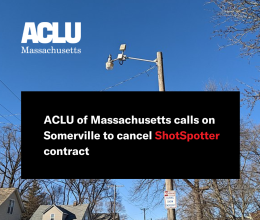
Records obtained by the ACLU of Massachusetts reveal extensive, warrantless surveillance of Massachusetts residents’ communications records. Under a law passed in 2008, prosecutors in Massachusetts may demand IP address logs, subscriber information, banking and credit card records, and call records revealing sensitive details about a person’s life—all without any judicial oversight or external accountability. The Boston Globe reports:
“It’s a sanctioned fishing expedition tool,” said Kade Crockford, director of the Technology for Liberty Program at the ACLU of Massachusetts. “It shouldn’t be easy for law enforcement to dig around in our communications records, and find out who we’re talking to, and for how long, and be able to strip us of our anonymity online, simply by signing a piece of paper.”
To shed more light on the issue, the ACLU recently asked Healey and the state’s 11 district attorneys how many administrative subpoenas they issued between 2014 and 2016, and the types of investigations for which they were needed. District attorneys Thomas M. Quinn of Bristol County and David E. Sullivan of the Northwestern District did not respond to the request.
Conley, Michael W. Morrissey of Norfolk County, Anthony D. Gulluni of Hampden County, and Jonathan W. Blodgett of Essex County declined to provide data, saying they did not track their use of the subpoenas or would not release the information because it relates to investigations and is therefore exempt from the public records law. As a result, for six district attorneys, almost nothing is known about how many people were targeted, and for what purpose.
Four other district attorneys disclosed a limited amount of data. But Healey and Middlesex District Attorney Marian T. Ryan turned over a large trove of information that revealed how frequently the subpoenas are used.
Ryan’s office said it issued more than 2,400 over the last three years, while Healey’s office said it sent more than 1,200 during the period.
Healey’s office did not disclose all of the criminal matters involved but said some were related to human trafficking, child sex abuse, larceny, and drugs.
The ACLU recently won a lawsuit seeking to make public records related to a controversial 2011 subpoena filed by the District Attorney for Suffolk County.







